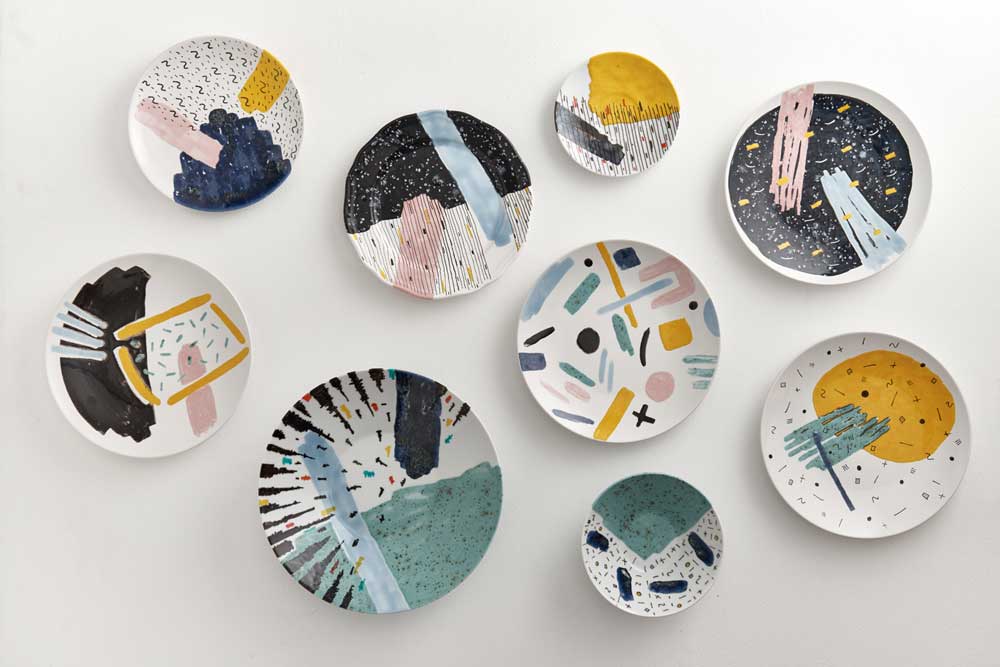Curators: Johnathan Hopp and Maya Ben David
Exhibition Design: Itay Ohaly
Graphic Design: Dana Zelig
Photographs: Shahar Tamir
Exhibition: Thursday 14/4/16 – Saturday 4/6/16
Festive Opening: Monday 18/4/16 at 19:30
Local Design – Local Production | Gallery tour: Saturday 4/6/16 at 11:00
Gallery tour with the curators of the exhibition followed by a short conference concerning the relationship between local design and local production in Israel today.
What if a factory for the production of ceramic vessels managed to survive devastating changes of the time and continued to be in production until today? The decline of production in the western world in the last decades raises public discussion on the causes and results to the economy, technology and society. What is the value of local design and production today? What are the alternatives that present themselves today instead of local industry?
11:00 – 11:45 Gallery tour with Maya Ben David and Johnathan Hopp – Exhibition Curators
11:45 – 12:00 Break
12:00 – 12:15 Opening remarks – Shlomit Bauman – Curator of the Benyamini Center
12:15 – 12:45 Post-industrial design: trends, and opportunities to maintain industrial design in an envinronment without industry – Tal Erez, Designer, Curator and lecturer Bezalel Art and Design Academy
12:45 – 13:15 The studio as an alternate production possibility – Boaz Kahn: Owner and partner of Studio Kahn specializing in production and development of ceramic products
13:15 – 13:45 Design from Here – Oded Friedland – Designer, Lecturer Bezalel Art and Design Academy, entrepreneur and founder of the company Monkeybusiness
Free admission
Advance registration: Tel 03-5182257 or [email protected]
Participants: Itay Ohaly, Orly Eleanora Edlavitch, Studio Bakery – Ran Amitai and Gili Kochik, Dov Ganshrow, Yahalomis – Tal Hadar and Roy Yahalomi, Oded Webman, Dana Zelig, Studio Dor Carmon, Maya Muchavsky Parnas, Shay Nipossi and Andrey Grishko, Studio Kahn – Mey and Boaz Kahn, Shira Keret and Itay Laniado, Liora Rosin, Reddish – Naama Steinbok and Idan Friedman
About the exhibition:
“The Postmodern universe is no longer a theoretical rumor echoing from afar: it has become the intimate space of our lives, the physical, conceptual, and emotional environment in which we Israelis get up in the morning and go to sleep at night.” (Larry Abramson, “A Pile of Things”, Mini Israel)
Mass production is a means of cultural making that duplicates itself and filters into our daily lives, homes and collective memories. “Matter of Fact” examines the value and meaning of local production and design today through the prism of the ceramics industry.
For six decades the Lapid ceramics company manufactured cheap, useful table and sanitary wares that became common and distinguishable in most homes in Israel. During the eighties, as part of a global financial shift and with little care as to the ability of local manufacturers to withstand the change, import taxes were lifted for many products, including ceramic wares. The local market was flooded with cheap merchandise that rapidly eroded the value of locally manufactured goods. In less than a decade from this change, the Lapid factory closed for good, along with all the other ceramic tableware producers in the country.
What if the factory had managed to survive this devastating change and continue production up until today? The imaginary successor of Lapid, whose products and production lines are depicted in the exhibition, is a case study for the potential ceramic industry in Israel. The exhibitors have imagined themselves as the designers of this factory and have filled the production lines with industrially made objects that reflect their outlook on utility, locality, efficiency, production and aesthetics.
The disappearance of the ceramic industry in Israel is part of a broader decline of industry in the West in general in the last few decades. This trend raises public debate as to its causes and effects, and as to the economic, technological and social aspects involved. While these issues play vital roles in examining productivity and industry, this exhibition highlights another discussion. It examines the connection and dialogue between industry and culture, and the repercussions of this connection on the material environment, on cultural intellectual property, and on local identity.
Our everyday household objects express technological, material, formal and functional considerations that are amalgamated on the factory production line. Through their design and manufacturing process, the end products reflect the spirit of time and place of their creation. Mass distribution and daily use grant these objects with the potential of affecting our cultural identity. And so we ask, what are the cultural consequences of the exclusion of such industry? The projects exhibited in “Matter of Fact” create a picture, a possible vision of what might be gained by promoting local design-driven industry.
This exhibition is with the support of Mifal Hapais

